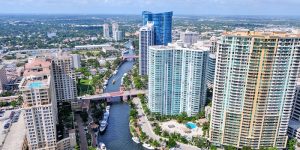
The Good News provides a monthly column with important content having to do with topics from the legal community. William “Bill” C. Davell and Matthew Zifrony, a member of Tripp Scott’s acclaimed condominium and homeowners’ association practice, examines what new legislation means for you.
Mission accomplished. Governor Ron DeSantis brought the Legislature back to undertake reforms of Florida’s troubled insurance industry and address condo safety concerns 11 months after the Surfside collapse that claimed 98 lives, and the two bills promptly passed. What does this new legislation mean for you?
Bill Davell: Let’s start with the insurance reform bill. What does it do and who benefits?
Matthew Zifrony: Some argue that the insurance reform doesn’t do enough to bring down rates for consumers. But the most important thing now is to stabilize Florida’s devastated insurance industry enough to sustain any semblance of choice and competition in the face of multiple providers going out of business, and the bill takes important steps in that direction.
Specifically, it provides a $2 billion “reinsurance” fund to reimburse a share of insurance companies’ losses related to the two largest hurricanes in a contract year. And it goes after practices that were draining insurance company coffers: a common insurance fraud involving “free” roof repairs and assignments to contractors of the rights to collect attorney fees in litigation, which were being abused by unscrupulous lawyers. It also increases financial regulation of insurers to ensure their stability.
BD: So what is in the bill for consumers?
MZ: First of all, there are some important consumer protections:
- Requiring insurers to undertake timely inspections of property losses, to inform policyholders of their rights to inspection reports, and to provide a reasonable explanation of claim payments below adjusters’ estimates.
- Prohibiting insurers from refusing to issue or renew a homeowner’s policy solely because of the age of the roof if it is less than 15 years old – some insurers were requiring homeowners to replace roofs as soon as 10 years – and allowing homeowners to ask for roof inspections for older roofs when coverage is denied.
There is some potential for rate reductions: the reinsurance provision requires companies to pass on any savings to consumers.
But the bill puts cash into the hands of homeowners in another important way: under the My Safe Florida Home program, it funds, for owners of single-family residences in eligible areas:
- Hurricane mitigation inspections and
- 2 to 1 matching grants of up to $10,000 for hurricane “hardening” on homesteaded single family homes with a value of $500,000 or less.
BD: What about the condo safety bill?
MZ: That’s where things could start getting expensive. Beginning in 2024, the bill requires condo and co-op buildings three stories and higher to be inspected for structural integrity if it’s been 30 years or more after they were initially occupied – 25 years for buildings within three miles of the coast. There would be a more intensive “phase 2” inspection if the first inspection reveals serious deterioration.
The bill also requires these condominiums and cooperatives to conduct studies every 10 years to determine the need for structural reserves and prohibits waiver of funding for certain structural reserves. Developers will
have to complete structural integrity reserve studies, and start funding reserves, before turning homeowners associations over to owners, and won’t be able to waive those reserves.
These reports will also have to be part of the association’s official records and provided to potential purchasers. And it creates legal liability for HOA board members: failure to perform these duties will be considered a breach of the fiduciary duty to unit owners.
BD: So what do homeowners, HOAs and board members need to do?

MZ: HOA boards, who as we have covered in a previous Good News are already under tremendous pressure with rising costs and fees, need to start planning now for the new inspection regime. That means getting in touch with inspectors and getting estimates, budgeting for those expenses, and getting a sense of needed structural reserves and repairs, knowing these costs could be in the tens and even hundreds of thousands. And they need to inform and prepare current and potential homeowners for these rising costs.
If you think you have been a victim of insurance fraud or unfairly denied coverage or payment for a claim, the lawyers in Tripp Scott’s insurance practice group use their recognized skills as trial and appellate counsel on behalf of policyholders. Our condominium and homeowners’ association team is happy to advise boards on the complexities of condominium law, best practices for both management and governance, and on preparing yourselves for the “storm” ahead with the new inspection and reserves regime.
Read more Ask Bill at: https://www.goodnewsfl.org/author/william-c-davell/
———————————-
If you have any topics you think my be of interest to our readership, we encourage you to email us at [email protected]

Comments